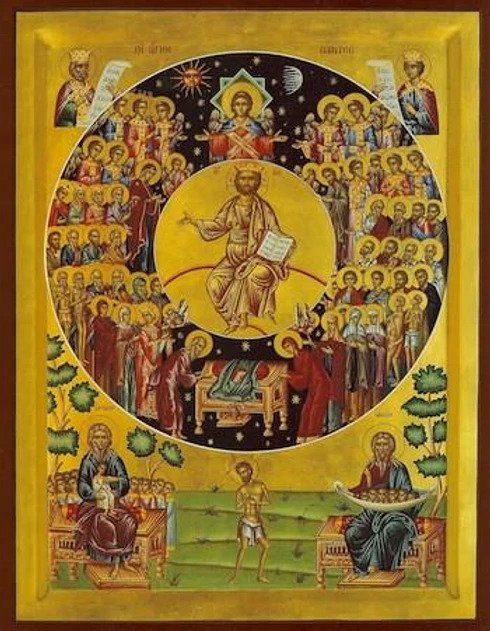“They (the saints in the Old Testament) were stoned, they were sawn in two, were tempted, were slain with the sword. They wandered about in sheepskins and goatskins, being destitute, afflicted, tormented – of whom the world was not worthy. They wandered in deserts and mountains, in dens and caves of the earth. And all these, having obtained a good testimony through faith, did not receive the promise, God having provided something better for us, that they should not be made perfect apart from us. Therefore we also, since we are surrounded by so great a cloud of witnesses, let us lay aside every weight, and the sin which so easily ensnares us, and let us run with endurance the race that is set before us, looking unto Jesus, the author and finisher of our faith, who for the joy that was set before Him endured the cross, despising the shame, and has sat down at the right hand of the throne of God.” (Hebr 11: 37 – 12: 2)
The witnesses to the true God, who lived before the coming of Christ, “did not receive the promise” of salvation through Him, until He tore asunder the man-made “curtain” that had separated God from us (Mt 27: 50-51) through His death-trampling death. The Old-Testament saints had to wait, even beyond their earthly lives, for the “something better” that God had provided for all of us, in the coming to us, and dying and rising again for us, of His all-unifying Son. “When I am lifted up from the earth,” Christ promised us, speaking about His elevation onto the Cross, “I will draw all men to myself.” (Jn 12: 32)
Even though we live “after” the coming of the Promised One, our Lord Jesus Christ, into human history, in our personal “histories” we share the experience of the Old Testament saints, of needing to wait, and endure, – as did He, – on the cross-carrying journey. In different ways, we also experience stretches of time in which we “do not receive the promise,” and might even feel abandoned by God, – as did He, when He cried out from the Cross, “My God, my God, why have you forsaken me?” (Mt 27: 46) But, differently from the Old Testament saints, “we” who live in the era of the Church are given to “look unto Jesus, the author and finisher of our faith,” and to have communion, or participate, already here, in the New Life of the risen Lord. On the one hand, we are called to “more” communion, in Christ, Who offers Himself to us in His Body and Blood. On the other hand, we are given more “responsibility,” that is, “ability to respond,” to that call, being empowered by the abundant grace of the Holy Spirit, poured out on us in the sacraments. So “let us lay aside every weight, and the sin which so easily ensnares us,” like self-centered fears, resentments, despondency, and so on, and “run with endurance” the adventure into which God has sent us, entrusting each of us with our specific vocations. “Help us, save us, have mercy on us, and keep us, O God, by Your grace.”






